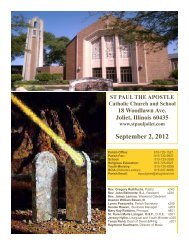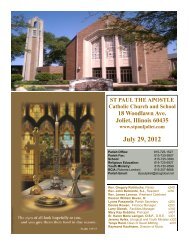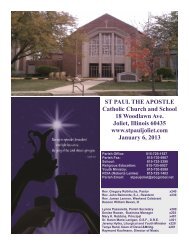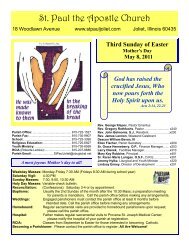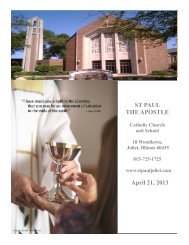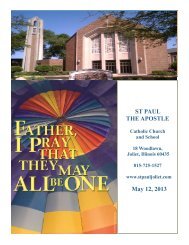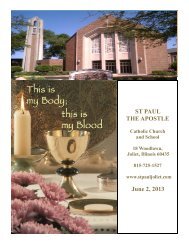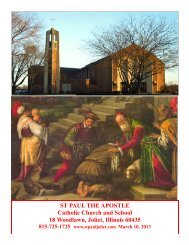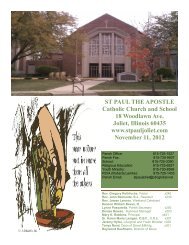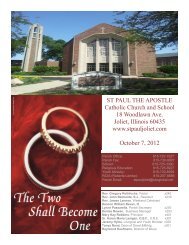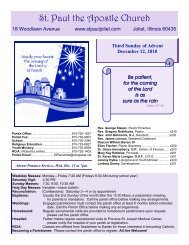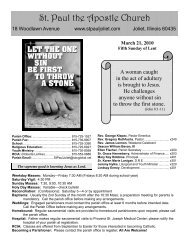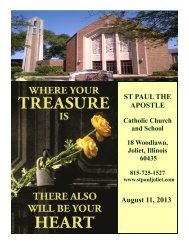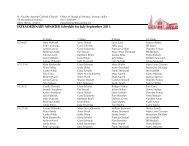December 23 - St. Paul the Apostle Church - Diocese of Joliet
December 23 - St. Paul the Apostle Church - Diocese of Joliet
December 23 - St. Paul the Apostle Church - Diocese of Joliet
You also want an ePaper? Increase the reach of your titles
YUMPU automatically turns print PDFs into web optimized ePapers that Google loves.
Join us once a month from<br />
7:30-9:00pm in room A4 <strong>of</strong><br />
<strong>the</strong> Activity Center!<br />
<strong>St</strong>. <strong>Paul</strong> <strong>the</strong> <strong>Apostle</strong><br />
Liturgical Ministry<br />
More info contact Jeremy at<br />
stpaulsliturgy@sbcglobal.net<br />
or 815-730-8599<br />
The next session is January 8th The Rise <strong>of</strong> <strong>the</strong><br />
Kingdom: Israel’s First Kings<br />
BIBLE STUDY SERIES<br />
MEMORIES AND DREAMS<br />
Throughout our lives, we retain <strong>the</strong> language and<br />
habits <strong>of</strong> our native region and family <strong>of</strong> origin. Should we<br />
return to our home after a long absence, we quickly revert<br />
to its familiar speech and practices. Our deep memory is<br />
reflected in old stories and words and speech patterns. This<br />
familiarity runs like an underground river and accompanies<br />
us wherever we go.<br />
Not only do we remember, we are incorporated<br />
into and made part <strong>of</strong> a greater memory. In remembering<br />
and recollecting, we are in turn ga<strong>the</strong>red up and recollected.<br />
Today we remember Mary, a small figure travelling<br />
<strong>the</strong> country roads to visit Elizabeth. All <strong>the</strong> great pronouncements<br />
and dreams <strong>of</strong> <strong>the</strong> prophets point to this time<br />
when <strong>the</strong> Lord’s words to Mary would be ga<strong>the</strong>red and<br />
fulfilled. The memories <strong>of</strong> her people are alive in her, and<br />
memories <strong>of</strong> her<br />
nourish our own<br />
living faith.<br />
Copyright © J. S. Paluch Co.<br />
PRAY FOR<br />
PEACE AND<br />
GOODWILL<br />
ON EARTH<br />
Saint Peter Canisius, Doctor <strong>of</strong> <strong>the</strong> <strong>Church</strong><br />
Saint Peter Canisius<br />
was a Jesuit priest at <strong>the</strong><br />
height <strong>of</strong> <strong>the</strong> many<br />
Protestant reformations in<br />
16th century Europe. He is<br />
known as a prolific Catholic<br />
<strong>the</strong>ologian, preacher,<br />
teacher and evangelizer.<br />
Canisius was born<br />
in 1521 in <strong>the</strong> city <strong>of</strong><br />
Nijmegen, now in <strong>the</strong> Ne<strong>the</strong>rlands,<br />
son <strong>of</strong> <strong>the</strong> city’s<br />
burgermeister (mayor). At<br />
age 15, he studied at <strong>the</strong><br />
University <strong>of</strong> Cologne,<br />
earning a master’s degree<br />
in<br />
1540. Following his stewardship desire to serve<br />
God in <strong>the</strong> <strong>Church</strong> in Germany, he became <strong>the</strong> first<br />
Dutchman to join <strong>the</strong> newly formed Society <strong>of</strong> Jesus<br />
in 1543.<br />
Canisius became one <strong>of</strong> <strong>the</strong> most influential Catholics<br />
<strong>of</strong> his time. Through his teaching, preaching and<br />
writing, he led an historic renewal <strong>of</strong> <strong>the</strong> Catholic faith<br />
in sou<strong>the</strong>rn Germany and Austria. Canisius wrote a<br />
number <strong>of</strong> books, preached retreats, founded <strong>the</strong> first<br />
German-speaking Jesuit colleges, and cared for <strong>the</strong><br />
sick, reputedly traveling more than twenty thousand<br />
miles on foot or horseback. Because <strong>of</strong> <strong>the</strong>se frequent<br />
travels, tedious and dangerous at <strong>the</strong> time, he<br />
became known as <strong>the</strong> Second <strong>Apostle</strong> <strong>of</strong> Germany<br />
after Saint Boniface. Canisius declined an appointment<br />
to become Archbishop <strong>of</strong> Vienna in order to<br />
continue his evangelizing ministry.<br />
Renowned as a popular preacher, Canisius<br />
packed churches and was said to have been so eloquent<br />
and convincing that he attracted hundreds <strong>of</strong><br />
Protestants back to <strong>the</strong> Catholic faith.<br />
Canisius produced a well-organized and easily<br />
accessible German- language catechism, followed by<br />
two abbreviated versions: one for middle school students<br />
and one for young children.<br />
Canisius was influential with Emperor Ferdinand<br />
I, and participated in <strong>the</strong> Council <strong>of</strong> Trent. Devoted to<br />
<strong>the</strong> Virgin Mary, he is credited with adding to <strong>the</strong> Hail<br />
Mary <strong>the</strong> sentence Holy Mary, Mo<strong>the</strong>r <strong>of</strong> God, pray<br />
for us sinners. When asked if he felt overworked, <strong>the</strong><br />
energetic Canisius replied with a stewardship quote:<br />
“If you have too much to do, with God’s help you will<br />
find time to do it all.”<br />
Canisius died on <strong>December</strong> 21, 1597 at age 76.<br />
Canonized and declared a Doctor <strong>of</strong> <strong>the</strong> <strong>Church</strong> in<br />
1925, he is <strong>the</strong> patron saint <strong>of</strong> Germany. His feast<br />
day is <strong>December</strong> 21.



